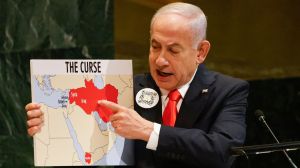Borrowing Prime Minister Narendra Modi’s election slogan, US Secretary of State Michael R Pompeo Thursday pushed for a deeper relationship with India ahead of his visit to Delhi on June 25-26, his first trip to the country after the new Modi government took charge.
“As Prime Minister Modi said in his latest campaign, ‘Modi hai to mumkin hai,’ or ‘Modi makes it possible’, I am looking forward to exploring what’s possible between our people,” Pompeo said in a major India policy speech at the India Ideas Summit of the US-India Business Council.

Amid differences between Washington and Delhi over trade issues, Pompeo said that the US is open to dialogue to resolve trade differences with India by allowing Americans companies more access to Indian markets.
Story continues below this ad
“Now, I am sure we will broach some tough topics too. But as we democracies have come to know, that we work out our disagreements. We bring them to the table honestly and fairly. And we will probably discuss the recent decision on the GSP programme.”
“We remain open to dialogue, and we hope that our friends in India will drop their trade barriers and trust in the competitiveness.” “We will also push for the free flow of data across borders — not just to help American companies — but to protect data and ensure consumer privacy,” he said.
India and the US, he said, must embrace the strategic framework that works for both nations. “We respect India as a sovereign power, with its unique politics and strategic challenges. We realise it’s different to deal with the likes of China or Pakistan from across an ocean than across the border,” he said.
And under President Trump, he said, “We have taken our defence cooperation to new heights, solidified our common vision for the Indo-Pacific, and taken a far tougher stand on Pakistan’s unacceptable support for terrorism in the region.”
Story continues below this ad
Stressing that the two countries have to deliver and execute, Pompeo said that the Trump administration has already enabled American companies to export more high-tech items to India. “This includes cutting-edge defence platforms like armed UAVs and ballistic missile defence systems. We have already launched the Asia-EDGE programme to help India raise private capital to meet its energy and security needs for years to come. These are solid achievements, but we want to do so much more.” He then outlined key “overlapping interests”: defence, energy, space.
On defence, he said that the first batch of Apache helicopters are coming off Boeing’s production line in Arizona. “Lockheed Martin’s F-21 and Boeing’s F/A-18 are state-of-the-art fighters that could give India the capabilities it needs to become a full-fledged security provider throughout the Indo-Pacific.”
On the energy front, he indicated developing India’s nuclear sector which will reduce dependence on Iran for energy needs. “On energy, we want to complete the Westinghouse civil nuclear project, and deliver more LNG and crude. These steps will give Indians reliable, affordable, diversified energy independence so they will no longer have to rely on difficult regimes like those in Venezuela and in Iran,” Pompeo said.
On space, he said, “NASA is already working with the Indian Space Research Organization on the world’s most advanced earth-observation satellite and India’s second lunar mission. I mean, how cool is that?” He said it’s only natural that the world’s most populous democracy should partner with the world’s oldest democracy to maintain the shared vision throughout the Indo-Pacific.
Story continues below this ad
“We also have to make sure that we have economic openness. We have to have a central theme being the idea that we have liberty and sovereignty in each of our two nations, and build on those ideas. These need to be places in which economic growth reinforces our democratic values, and not dictatorship. It needs to be a place where our partnership is one of true equals, not of domination.
Based on my conversations in New Delhi last year, and in subsequent phone calls and meetings, I believe this is a deeply shared vision,” he said.

 U.S. Secretary of State Mike Pompeo (File/AP Photo)
U.S. Secretary of State Mike Pompeo (File/AP Photo)






























